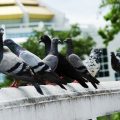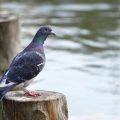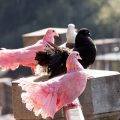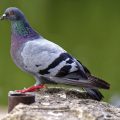Table of Contents
Both domesticated pigeons and doves really love human interaction. They are considered to be peaceful and quiet and would not only make great pets but also would do well for pigeon racing birds. Your pet pigeon, as well as other types of doves, have have a unique appeal due to their special characteristics. Most of the pigeon racing birds usually have a pleasant one. They have a cooing sound and mostly, would have around four to five types of call. Head nodding is accompanied by the strut of these adorable birds.
When both doves and pigeon racing birds breeds take flight, they usually take off with a slight whirring sound. The two breeds are known for their flying behaviors which includes homing instincts as well as aerial acrobatics. From this, we can say that this bird is very entertaining while still maintaining their usefulness. Throughout their life, they are tasked to deliver messages, and thus were known to be carrier pigeons. Aside from this, their homing instinct is still used today.
Another good thing that influenced the popular sport of pigeon racing is their homing instinct. As we have told you before, this instinct is still used today and the popularity of the white pigeons for wedding releases.
Birds Ideal for Pigeon Racing
Wallcote
As we have told you before, large birds are great for free flights, especially for acrobatic flyers. These birds really enjoy this and would be great for their health. A wallcote might be the most practical for large birds and might be good for a small number of birds. This piece should be faced against the side of the house, might be great for facing southwest or southwest. The wallcote is made of a waterproof shelter that has compartments and a porch or even a landing board. The size of the compartment heavily depends on the type of the bird.
If you will own a medium sized pair of birds, you would need a compartment of around 26” wide, 18”-20” deep, and 16” high. The entrance should be around 5” to 6”. The landing board for this could be around 8” wide and this could also be a place to put heave crocks for both the water and food. You could also add more compartments as you increase the number of your birds.
Polecote
Polecote is another type of dovecote. This dovecote is a both a landing and shelter platform that is mounted on a free standing pole. This dovecote is more decorative rather than practical.
Garden Cote
A garden cote is known to be an aviary that is opened up. This would allow free flights.
Maintenance
The basic aviary care, which would include the bird care, requires daily cleaning of the food dishes as well as water, and the bathing bowls. You should wash all the platforms and perches weekly. You also need to disinfect the entire bird house as well the accessories with a mild bleach solution periodically. You would also need disinfecting and a total housing down of your aviary yearly. Replace anything that needs to be freshened such as nests, old dishes, and even perches. This would ensure that the pigeon racing pet is well maintained.
Social Behaviors
When they are in the wild, almost all types of pigeons and doves are known to flock. Some do it all year round while some only do it seasonally. Most of these birds would live together peaceable if only they are given a lot of rooms. If they are kept in a small area, they could become very aggressive, especially during breeding seasons. All the pigeons and doves could become somewhat territorial. Some of these birds could become very to extremely aggressive. Make sure to do thorough research about the behavior of the birds before you would put them together.
Aside from the things we have mentioned, you also need to be careful when adding a new bird to a cage if there is already existing birds on it. Most of the pigeons and doves are very territorial. They will not appreciate a new roommate and would protect their space, they would even kill the newbie in their area.
Do not fret, many bird
species could be housed together with other birds in an aviary, some of which
are parakeets and finches, but you should house separately those species which
are aggressive. Pigeons and doves do not go well together with either your cats
or dogs.
Handling/Training
If you raise your young birds in an aviary, it could become very affectionate once they settled into their new family and home. This might be the best pet for you become it will become very devoted and quite tame, the pigeons and wild doves area generally cautious and won’t keep down their guard. Your will birds would be reserved and shy and would seldom show their affection.
When you first welcome your bird home into your life, you need to allot a week or so with little to no disturbance and do not let it out of its cage. There are so many things that your pet needs to be familiar with in a cage. Give a chance for your bird to get to know both you and get comfortable in the new environment.
When it is now comfortable with the new environment and you, it is now time that you let it out to explore the rest of its environment. Pigeons and doves enjoy great time out of their cage daily. Your pet dove could become people oriented.
Activities
Most pigeons and doves are seed eaters, it means that they are ground dwellers. They love to walk around and would roost up higher. Some of these birds are free flyers that like to travel anywhere. Your bird needs to have a flight space, if you keep your bird stuck in a cage, it would need a time out every day to walk or just fly around.
Your pigeon racing birds and doves do not tuck their heads under their wings just like many birds when resting. What they would do is hunch down pulling their head in between what they call their shoulders.
Potential Problems
Pigeons and doves are very hardy birds. If you take care of them well, they would seldom get sick. They do not like a cool, wet, and drafty environment even though they are very cold hardy.
Signs of Illness
Signs of illnesses that you should be aware of are the following: being abnormally quiet or fitting for longer than usual, fluffed feathers, closed eyes, head to one side, head nodding, sharply protruding breast bone, balance problem, slimy droppings, and even a dirty vent.
Common Illness
Your pigeon or dove could have some of the common listed illnesses, some of them might include: internal parasites such as roundworm, threadworm, or tapeworm, pigeon pox, external parasites such as wounds, ticks or mites, and parrot fever that is also known as psittacosis. An ailing pigeon racing bird or dove should be directly taken to an avian veterinarian for diagnosis as well as treatment.
Availability
Some pigeon racing birds and doves are easily available at your pet store, however, there are other varieties that you can only find through bird clubs, bird shows, or even breeders.






 Author and long-time animal lover. Sharing knowledge on pet care through experience and the written word.
Author and long-time animal lover. Sharing knowledge on pet care through experience and the written word.